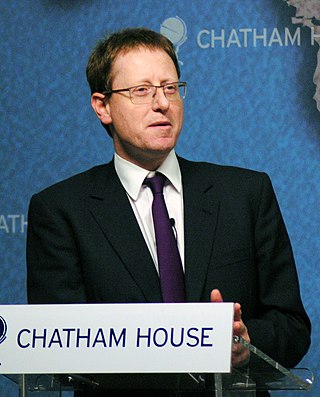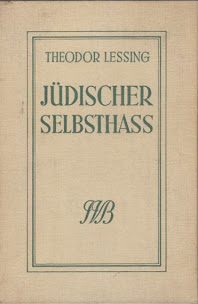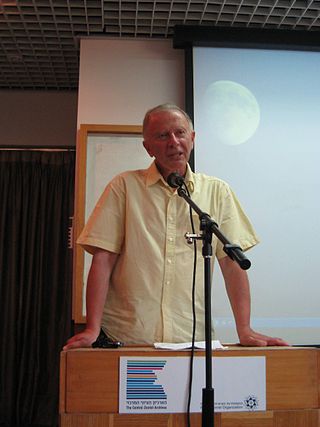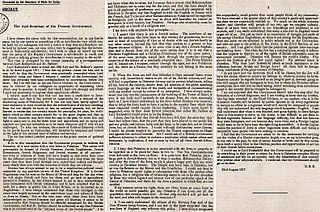Related Research Articles
Antisemitism is hostility to, prejudice towards, or discrimination against Jews. This sentiment is a form of racism, and a person who harbours it is called an antisemite. Though antisemitism is overwhelmingly perpetrated by non-Jews, it may occasionally be perpetrated by Jews in a phenomenon known as auto-antisemitism. Primarily, antisemitic tendencies may be motivated by negative sentiment towards Jews as a people or by negative sentiment towards Jews with regard to Judaism. In the former case, usually presented as racial antisemitism, a person's hostility is driven by the belief that Jews constitute a distinct race with inherent traits or characteristics that are repulsive or inferior to the preferred traits or characteristics within that person's society. In the latter case, known as religious antisemitism, a person's hostility is driven by their religion's perception of Jews and Judaism, typically encompassing doctrines of supersession that expect or demand Jews to turn away from Judaism and submit to the religion presenting itself as Judaism's successor faith—this is a common theme within the other Abrahamic religions. The development of racial and religious antisemitism has historically been encouraged by anti-Judaism, though the concept itself is distinct from antisemitism.
New antisemitism is the concept that a new form of antisemitism which developed in the late 20th and early 21st centuries, tends to manifest itself as anti-Zionism and criticism of the Israeli government. The concept is included in some definitions of antisemitism, such as the working definition of antisemitism and the 3D test of antisemitism. The concept dates to the early 1970s, although the identification of anti-Zionism with antisemitism has "long been de rigueur in Jewish communal and broader pro-Israel circles".

Jonathan Saul Freedland is a British journalist who writes a weekly column for the Guardian. He presents BBC Radio 4's contemporary history series The Long View. Freedland also writes thrillers, mainly under the pseudonym Sam Bourne, and has written a play, Jews. In Their Own Words, performed in 2022 at the Royal Court Theatre, London.

The terms "self-hating Jew" and "self-loathing Jew" are used to describe a Jew whose viewpoints on any specific matter are perceived as antisemitic. This phenomenon is also known as auto-antisemitism. Recognition of the concept gained widespread currency after German-Jewish philosopher Theodor Lessing published his 1930 book Der jüdische Selbsthaß, which sought to explain a perceived inclination among Jewish intellectuals towards inciting antisemitism by stating their views about Judaism. More recently, this spotlight on antisemitism motivated by self-hatred within the Jewish diaspora is said to have become "something of a key term of opprobrium in and beyond Cold War–era debates about Zionism" in light of how some Jews may despise their entire identity due to their perception of the Arab–Israeli conflict.

Stephen Robert Sizer is a priest in the Church of England. He is banned from serving as a priest until 2030. From 1997 to 2017, he was vicar of Christ Church, Virginia Water, in Surrey.
The Community Security Trust (CST) is a British charity whose purpose is to provide safety, security, and advice to the Jewish community in the UK. It provides advice, training, representation and research.

Robert Solomon Wistrich was the Erich Neuberger Professor of European and Jewish history at the Hebrew University of Jerusalem, and he was also the head of the university's Vidal Sassoon International Center for the Study of Antisemitism. Wistrich considered antisemitism "the longest hatred" and viewed Anti-Zionism as its latest incarnation. According to Scott Ury, "More than any other scholar, Wistrich has helped integrate traditional Zionist interpretations of Jewish history, society, and fate into the study of antisemitism." Other researchers have reproduced much of his work without questioning its founding assumptions.
Antisemitic tropes or antisemitic canards are "sensational reports, misrepresentations, or fabrications" that are defamatory towards Judaism as a religion or defamatory towards Jews as an ethnic or religious group. Since the Middle Ages, such reports have been a recurring motif of broader antisemitic conspiracy theories.
David Hirsh is a Senior Lecturer in Sociology at Goldsmiths, University of London, and co-founder of Engage, a campaign against the academic boycott of Israel.

Anti-Zionism is opposition to Zionism. Although anti-Zionism is a heterogeneous phenomenon, all its proponents agree that the creation of the modern State of Israel, and the movement to create a sovereign Jewish state in the region of Palestine—the biblical Land of Israel—was flawed or unjust in some way.
Antony Lerman is a British writer who specialises in the study of antisemitism, the Israeli–Palestinian conflict, multiculturalism, and the place of religion in society. From 2006 to early 2009, he was Director of the Institute for Jewish Policy Research, a think tank on issues affecting Jewish communities in Europe. From December 1999 to 2006, he was Chief Executive of the Hanadiv Charitable Foundation, renamed the Rothschild Foundation Europe in 2007. He is a founding member of the Jewish Forum for Justice and Human Rights, and a former editor of Patterns of Prejudice, a quarterly academic journal focusing on the sociology of race and ethnicity.
The European Institute for the Study of Contemporary Antisemitism (EISCA) was established in 2007 as a think-tank to examine the growth and development of antisemitism in the world today and to explore new strategies for countering it in all its forms. Its website was last updated in mid 2011.

Criticism of Israel is a subject of journalistic and scholarly commentary and research within the scope of international relations theory, expressed in terms of political science. Israel has faced international criticism since its declaration of independence in 1948 relating to a variety of topics, both historical and contemporary.
Anti-Jewish boycotts are organized boycotts directed against Jewish people to exclude them economical, political or cultural life. Antisemitic boycotts are often regarded as a manifestation of popular antisemitism.
Antisemitism in the United Kingdom signifies hatred of and discrimination against Jews in the United Kingdom. Discrimination and hostility against the community since its establishment in 1070 resulted in a series of massacres on several occasions and their expulsion from the country in 1290. They were readmitted by Oliver Cromwell in 1655.
There have been incidents of antisemitism in the Labour Party of the United Kingdom (UK) since its formation, including canards about "Jewish finance" during the Boer War and antisemitic comments from leading Labour politician Ernest Bevin. In the 2000s, there were controversies over comments made by Labour politicians about an alleged "Jewish lobby", a comparison by London Labour politician Ken Livingstone of a Jewish journalist to a concentration camp guard, and a 2005 Labour attack on Jewish Conservative Party politician Michael Howard.
The working definition of antisemitism, also called the International Holocaust Remembrance Alliance definition of antisemitism or IHRA definition, is a non-legally binding statement on what antisemitism is, that reads: "Antisemitism is a certain perception of Jews, which may be expressed as hatred toward Jews. Rhetorical and physical manifestations of antisemitism are directed toward Jewish or non-Jewish individuals and/or their property, toward Jewish community institutions and religious facilities." Accompanying the working definition, but of disputed status, are 11 illustrative examples whose purpose is described as guiding the IHRA in its work, seven of which relate to criticism of the Israeli government. As such, pro-Israeli organizations have been advocates for the worldwide legal adoption of the definition.
Since the foundation of the Conservative Party in 1834, there has been a variety of both proven and unproven anti-semitic accusations linked to Conservative party leaders and other party figures.

The Jerusalem Declaration on Antisemitism (JDA) is a document meant to outline the bounds of antisemitic speech and conduct, particularly with regard to Zionism, Israel and Palestine. Its creation was motivated by a desire to confront antisemitism and by objections to the IHRA Definition of Antisemitism, which critics have said stifles legitimate criticism of the Israeli government and curbs free speech. The drafting of the declaration was initiated in June 2020 under the auspices of the Van Leer Institute in Jerusalem by eight coordinators, most of whom were university professors. Upon its completion the declaration was signed by about 200 scholars in various fields and released in March 2021.
Zionist antisemitism is the phenomenon in which individuals, groups, or governments support the Zionist movement and the State of Israel while simultaneously holding antisemitic views about Jews. In some cases, Zionism may be promoted for explicitly antisemitic reasons. The prevalence of antisemitism has been widely noted within the Christian Zionist movement, whose adherents may hold antisemitic beliefs about Jews while also supporting Zionism for eschatological reasons. Antisemitic right-wing nationalists, particularly in Europe and the United States, sometimes support the Zionist movement because they wish for Jews to be expelled, or for Jews to emigrate to Israel, or because they view Israel as a supremacist ethno-state to be admired and held up as a model for their own countries.
References
- ↑ Anthony Julius (2010), Trials of the Diaspora, Oxford University Press, OL 24615680M
- ↑ Julius, Anthony. Trials of the Diaspora: A History of Anti-Semitism in England. Oxford, Oxford UP, 2010. pp. 584-586.
- ↑ Bloom, Harold (7 May 2010). "The Jewish Question: British Anti-Semitism". The New York Times. Retrieved 10 March 2016.
- ↑ Freedland, Jonathan (11 September 2010). "The Living Lie". The New Republic. Retrieved 10 March 2016.
- ↑ Sandbrook, Dominic (25 February 2010). "Trials of the Diaspora: A History of Anti-Semitism in England by Anthony Julius: review". The Daily Telegraph. Retrieved 10 March 2016.
- ↑ Antony Lerman, 'Trials of the Diaspora by Anthony Julius,' The Guardian 27 February 2010.
- ↑ Alderman, Geoffrey (29 April 2010). "Trials of the Diaspora: A History of Anti-Semitism in England". Times Higher Education. Retrieved 10 March 2016.